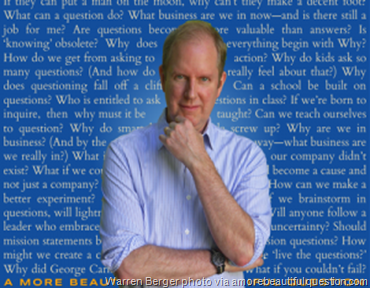 The entrepreneurs I see are always talking about “disruptive innovation” ideas, but the plans I read are more often linear extensions of a current hot offering, like one more social network with the best of Facebook and Twitter, one more dating site dimension, or another “must-have” accessory for smartphones. Perhaps hard questions need to come before ideas, rather than after.
The entrepreneurs I see are always talking about “disruptive innovation” ideas, but the plans I read are more often linear extensions of a current hot offering, like one more social network with the best of Facebook and Twitter, one more dating site dimension, or another “must-have” accessory for smartphones. Perhaps hard questions need to come before ideas, rather than after.
I just finished a provocative new book by Warren Berger, “A More Beautiful Question,” that makes a good case for the power of questions to spark breakthrough innovations. He argues and I agree that the most creative, successful business leaders tend to be expert questioners. They must master the art of inquiry, raise questions no one else is asking, and find powerful answers.
Berger suggests some base questions with a focus on existing companies that I have adapted for entrepreneurs and startups. Every smart entrepreneur needs to ask himself and his team these questions before charging down the road to meet the other ninety percent of his peers that fail:
-
What business are we really entering? Many aspiring entrepreneurs, especially engineers, are focused on their invention or technology, and never consider the challenges of entering the business realm until too late. Hydrogen auto engines, for example, have tremendous advantages, but haven’t cracked the bureaucracy of government regulations, the power of existing energy companies, and big auto biases.
-
Why have other smart people failed on a similar idea? All too often I hear the refrain that big existing players, like Microsoft or IBM, are too fat and slow to be real competitors. While these companies do have their challenges, they also have some of the smartest people out there. You need to question strongly why these failed on your innovation.
-
What will happen if we build it and no one comes? The “unthinkable” questions need to get asked before the crisis. Customers always have alternatives, most notably continuing to do what they do today without you. Asking the hard questions early will force more thinking outside the box, and improve the potential for real breakthroughs.
-
What if we could become a cause and not worry about profit? Every startup should start with a set of values that would fit the definition of a good cause. The new age of consumers, and the new age of young employees want to align themselves with good cause principles. Figure out what you are against, as well as what you are for.
-
How can we create the best test, and assume the need for pivot? Your first offering will likely be a learning experience, rather than a run-away success. Plan to make it the best experiment that you can, with metrics to focus on the “why,” as much as “what.” Create a safe environment for your team to question every aspect of the offering.
-
If we brainstorm in questions, will lightning strike? Collaborative thinking in problem solving and early planning is essential because it brings together multiple viewpoints and diverse backgrounds. Innovation flourishes when diverse ideas and thoughts are aired. Tackle the startup unknowns by generating questions instead of generating solutions.
-
Will anyone follow if we initially embrace uncertainty? Entrepreneurs are normally all about giving answers, not admitting uncertainty. They are reluctant to take advantage of questioning input from outside advisors, investors, and even friendly customers. Business leaders from Google, Netflix, and others have uncertainty built into their DNA.
-
Should our mission statement be a mission question? The declarative mission statement is usually seen by the team as non-questionable, thus limiting business thinking. In these dynamic times, it may be appropriate to take that static statement and transform it into more open-ended, fluid mission questions that can still be ambitious.
-
How do we create a culture of continuous inquiry? The first mistake is not wanting a culture of inquiry, in today’s age of continuous change. Some leaders and entrepreneurs don’t want to continually explain and rationalize their actions. The challenge is to reward questioning by your actions, culture, hiring, and the way you treat customer feedback.
If you want more specifics as well as the theory behind it, I recommend Berger’s book as a practical system of inquiry that can guide you through the process of innovative questioning, helping you find imaginative, powerful answers and building the culture of continuous innovation.

